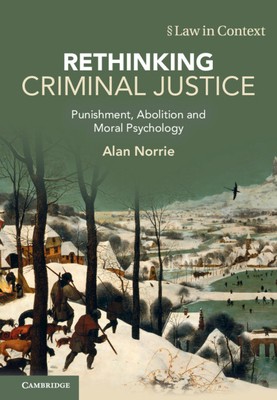
- We will send in 10–14 business days.
- Author: Alan Norrie
- Publisher: Cambridge University Press
- ISBN-10: 1108478875
- ISBN-13: 9781108478878
- Format: 17 x 24.4 x 2.1 cm, kieti viršeliai
- Language: English
- SAVE -10% with code: EXTRA
Reviews
Description
For 200 years, the penal equation 'crime plus blame equals punishment' has meant prison crises, a permanent crime problem, violent and damaged lives. The retributive theory of punishment supports this; fully developed, it could transform it. A moral psychology of violation distinguishes primitive and mature retributivism, explaining punishment's necessary failure and guilt, forgiveness and reconciliation's power. 'Atonement' means both punitive 'payback' and being 'at one' again with self and others. Reconciliation for offender, victim and society leads to punishment's deep, tendential abolition. Intellectually innovative and bold, Alan Norrie's mature retributivism is rooted in human ontology, in the metaphysical animal that thinks and loves. Speaking to law, philosophy, criminology and criminal justice, his moral psychology considers victims who victimise, grief at violation, denial and mourning and the loving prison. Exploring ethics, psychoanalysis, social theory, testimony and film, his psychologically developed moral philosophy challenges basic assumptions about punishment and the penal equation.
EXTRA 10 % discount with code: EXTRA
The promotion ends in 22d.17:14:55
The discount code is valid when purchasing from 10 €. Discounts do not stack.
- Author: Alan Norrie
- Publisher: Cambridge University Press
- ISBN-10: 1108478875
- ISBN-13: 9781108478878
- Format: 17 x 24.4 x 2.1 cm, kieti viršeliai
- Language: English English
For 200 years, the penal equation 'crime plus blame equals punishment' has meant prison crises, a permanent crime problem, violent and damaged lives. The retributive theory of punishment supports this; fully developed, it could transform it. A moral psychology of violation distinguishes primitive and mature retributivism, explaining punishment's necessary failure and guilt, forgiveness and reconciliation's power. 'Atonement' means both punitive 'payback' and being 'at one' again with self and others. Reconciliation for offender, victim and society leads to punishment's deep, tendential abolition. Intellectually innovative and bold, Alan Norrie's mature retributivism is rooted in human ontology, in the metaphysical animal that thinks and loves. Speaking to law, philosophy, criminology and criminal justice, his moral psychology considers victims who victimise, grief at violation, denial and mourning and the loving prison. Exploring ethics, psychoanalysis, social theory, testimony and film, his psychologically developed moral philosophy challenges basic assumptions about punishment and the penal equation.


Reviews